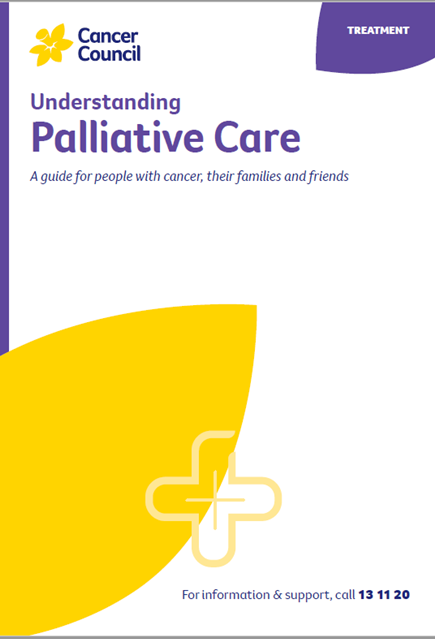- Home
- About Cancer
- Advanced cancer
- Palliative care
- Palliative treatment
- Common treatments
Common palliative treatments
See below for some common types of palliative care treatments.
Surgery
Surgery can be used to:
- remove all or part of a tumour from affected areas, such as the bowel or lymph nodes
- relieve discomfort caused by tumours blocking organs or pressing on nerves
- reduce tumour size (debulking) to help improve outcomes from chemotherapy and radiation therapy
- insert a thin tube (stent) into a blocked organ to create a passage for substances to pass through
Learn more about Surgery.
Drug therapies
Drugs can travel throughout the body. This is called systemic treatment.
Drug therapies include:
- chemotherapy – the use of drugs to kill or slow the growth of cancer cells
- hormone therapy – drugs that stop the body’s natural hormones from helping some cancers to grow
- immunotherapy – treatment that uses the body’s own immune system to fight cancer
- targeted therapy – drugs that target specific features of cancer cells to stop the cancer growing.
Some drug therapies can reduce a cancer that is causing pain because of its size or location; slow the growth of a cancer; and help control symptoms, including pain and loss of appetite. Other drug therapies can reduce inflammation and relieve symptoms such as bone pain.
Radiation therapy
This uses a controlled dose of radiation to kill or damage cancer cells so they cannot grow, multiply or spread. Radiation therapy can shrink tumours or stop them spreading further. It can also relieve some symptoms, such as pain from secondary cancers in the bones. You can have radiation therapy in different ways and doses. It can be given in single or multiple visits.
Learn more about Radiation therapy.
Podcast: Treatment Options for Advanced Cancer
Listen to more of our podcast for people affected by advanced cancer
→ READ MORE: Managing symptoms
More resources
Prof Meera Agar, Palliative Care Physician, Professor of Palliative Medicine, University of Technology Sydney, IMPACCT, Sydney, NSW; Anne Booms, Nurse Practitioner, Palliative Care, Icon Cancer Centre Midlands, WA; Nicola Champion, Consumer; John Clements, Consumer; Dr Alexandra Clinch, Palliative Medicine Specialist and Deputy Director, Palliative Care, Peter MacCallum Cancer Centre and Royal Melbourne Hospital, VIC; A/Prof Jaklin Eliott, School of Public Health, University of Adelaide, SA; Dr Jemma Gilchrist, Clinical Psychologist, Mind My Health, NSW; McCabe Centre for Law and Cancer, VIC; Caitlin MacDonagh, Clinical Nurse Consultant, Palliative Care, Royal North Shore Hospital, NSW; Dr Roya Merie, Radiation Oncologist, Icon Cancer Centre, Concord, NSW; Dr Deidre Morgan, Research Centre for Palliative Care, Death and Dying, Flinders University, SA; Caitriona Nienaber, 13 11 20 Consultant, Cancer Council WA; Palliative Care Australia.
View the Cancer Council NSW editorial policy.
View all publications or call 13 11 20 for free printed copies.

